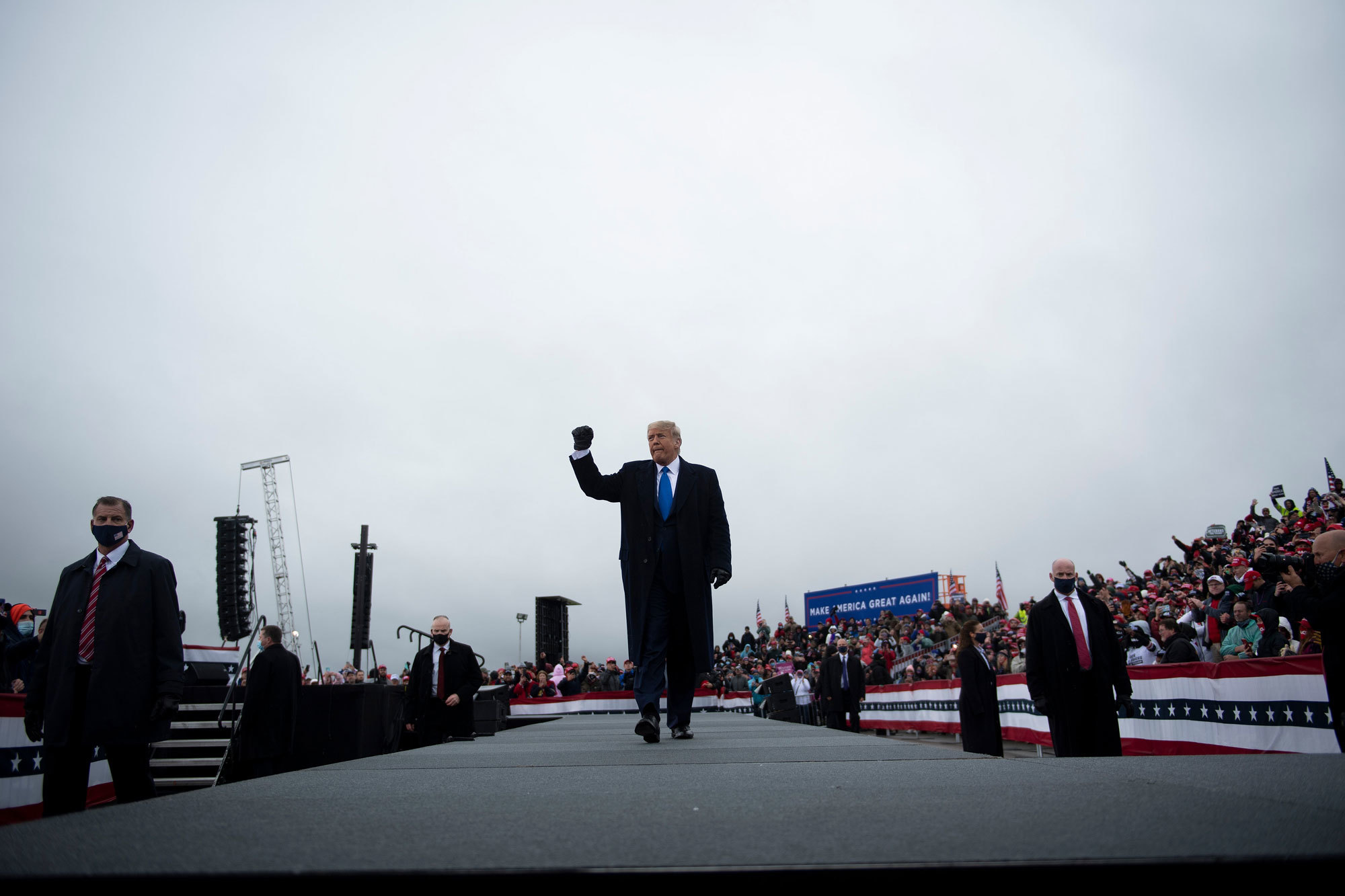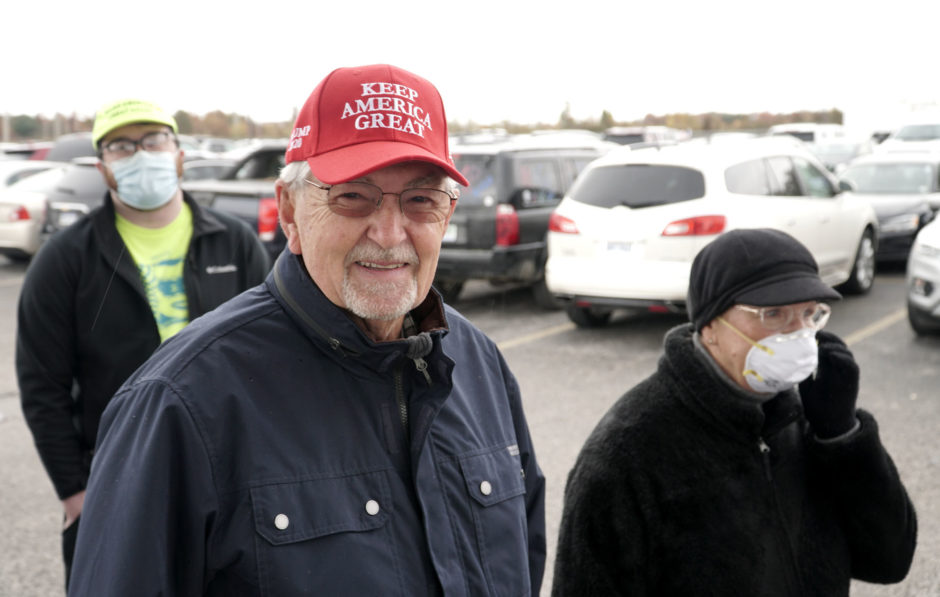October 30, 2020
Tammi Elzinga had been on her feet for nine hours, having arrived early at Muskegon County Airport in Michigan on a cold, overcast Saturday in October to make sure she got a spot at the massive outdoor rally for Donald Trump.
The U.S. president, who had been speaking for 75 minutes to thousands of supporters gathered outside the hangars of Flyby Air, the private charter company hosting the event, was still speaking when Elzinga and her friend decided to cut out early to get a head start on the crowds and traffic — it was a nearly three-hour drive back to their homes in Traverse City.
They were satisfied to watch the rest of Trump's speech on the big screen just outside the venue.
"Totally worth it," said Elzinga, a medical esthetician garbed in a Trump-branded tuque, scarf and mask, when asked about the experience.
Her friend, who didn't want to be identified, said she could listen to Trump's voice all day and wished he could be a "forever president."
Both voted for Trump in 2016, but neither are dyed-in-the-wool Republicans, having supported Barack Obama in 2008. But Obama didn't keep his promises, they said, without specifying which ones. Trump offered something new.
"He's not a politician. I think he's done great," said Elzinga.
That feeling is echoed by retiree Bob Davidson, who lives in the area. Wearing a "Keep America Great" hat, he summed up Trump's job performance in one word: "Fantastic."
"He's brought a lot of jobs back. He's kept all his promises," Davidson said.
Trump's rally here in western Michigan was in a county that went to Hillary Clinton four years ago — barely — and one Trump's team hopes to move into his column come Nov. 3.
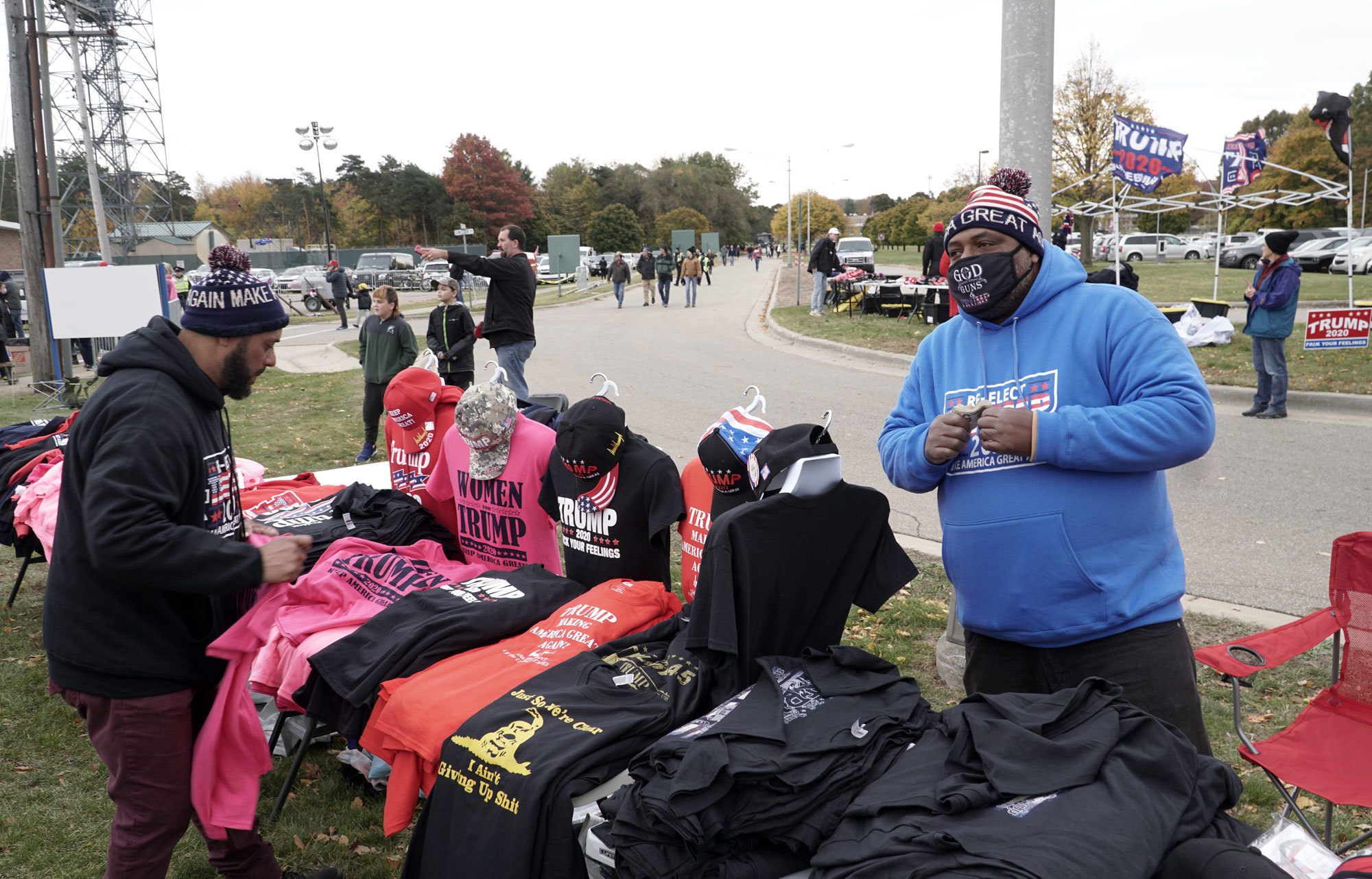
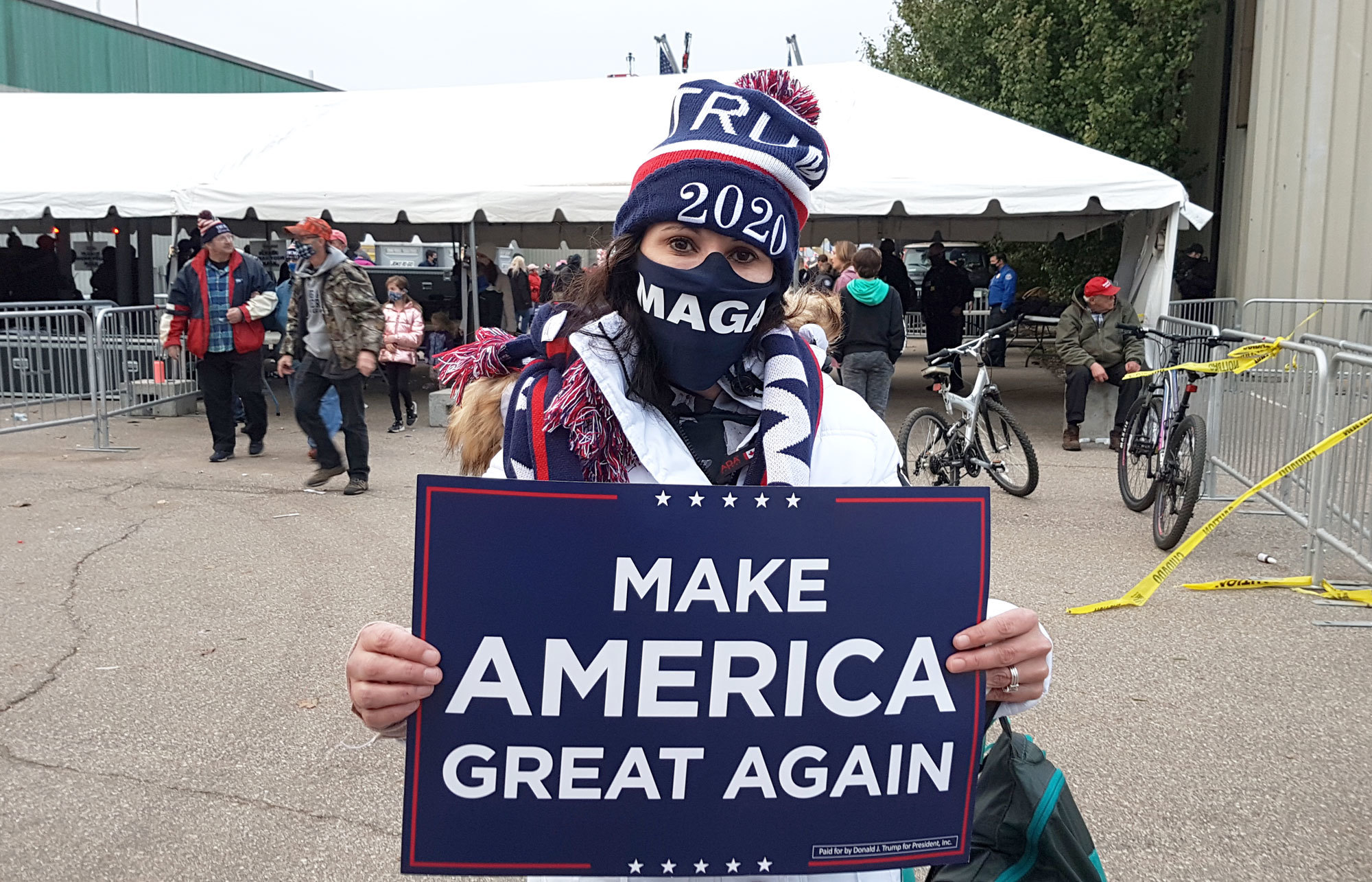
In 2016, Trump won Michigan by just over 10,000 votes, the tightest margin in the state's history and the tightest margin of any state in the U.S. that election. It was the first time a Republican presidential candidate had won the state since 1988.
With many states established as reliably red (Republican) or blue (Democrat), Michigan may be considered somewhat purple — meaning, in a close election, its 16 electoral votes could be crucial in clearing one candidate's path to the White House.
In recent history, this manufacturing-centred state, with its significant working-class, union voter base, has mostly gone Democrat for both president and the U.S. Senate. But the governorship has frequently changed party hands and the state's congressional delegation has been mixed.
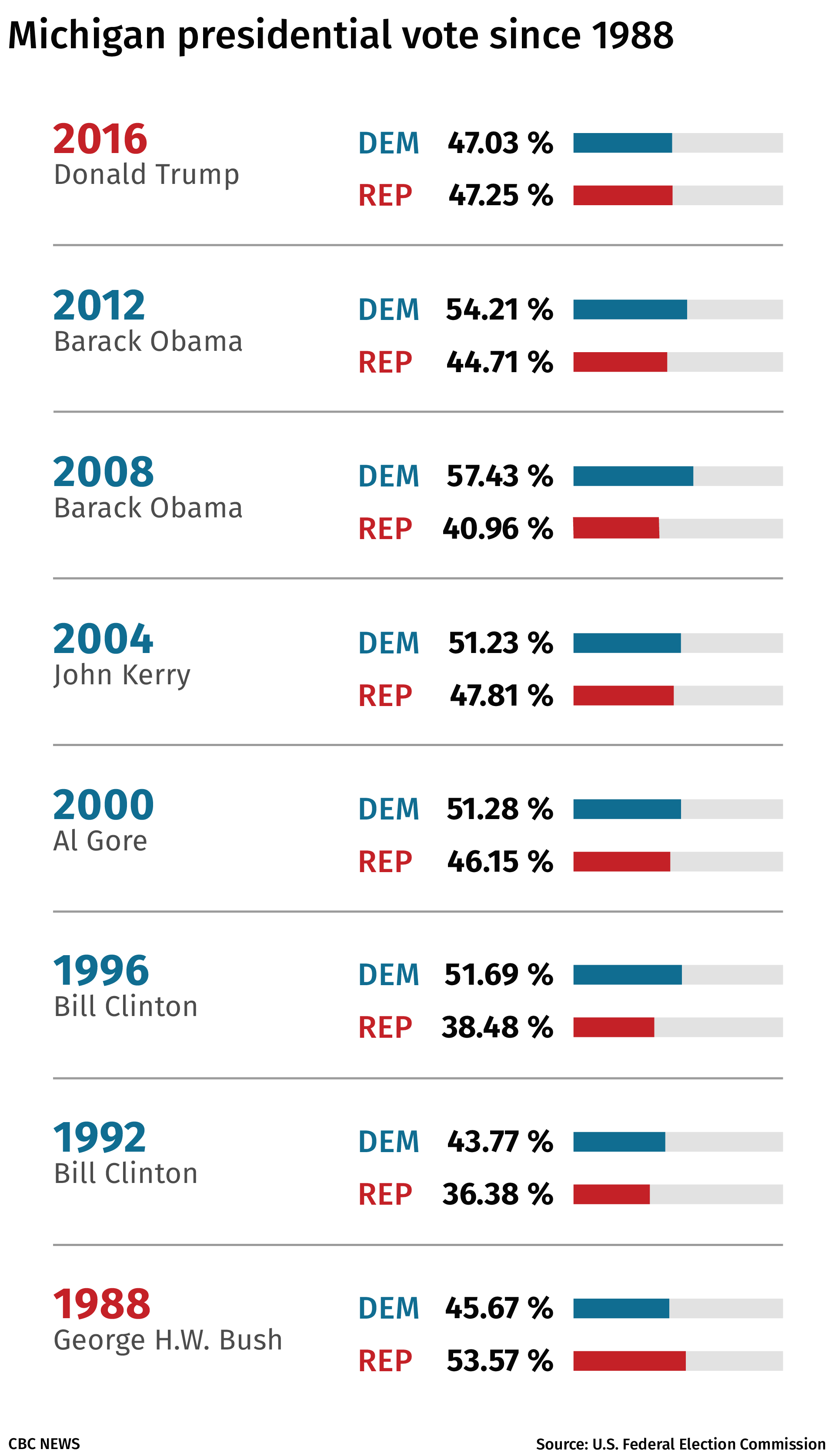
To understand just how important Michigan is to both parties in 2020, during a roughly two-week stretch in October, the state was visited by Trump three times, Democratic presidential candidate and former vice-president Joe Biden twice (including a joint appearance with Obama), Vice-President Mike Pence twice and vice-presidential candidate Kamala Harris, not to mention Trump's children (Ivanka, Eric and Don, Jr.) and Biden's wife, Jill.
During a recent campaign stop in Detroit, Harris told the audience, "You all are very likely going to make the decision about who is the next president of the United States."
The focus this year is on the 12 counties that had previously gone for Obama and flipped to Trump in 2016, including places such as Macomb County, the third-largest in the state. The area, historically a reliable Democratic union county that Obama won twice, went big for Trump, who beat Clinton by more than 11 per cent there in 2016.
The political environment, however, has changed since the last presidential election. The 2018 midterms saw something of a blue wave of Democrats winning key positions in the state, including the governorship.
"In 2016, we had a very low turnout. Just two years later, I won by over 400,000 votes," Gov. Gretchen Whitmer told CBC News. "We are in line for a historic election — turnout unlike anything we've ever seen, I believe."
WATCH | How Donald Trump and Joe Biden are campaigning in U.S. swing states:
Polls suggest Biden is leading here and has been consistently garnering support near or above the 50 per cent mark. Compare that to Clinton, who was always in the low- to mid-40s in 2016.
Still, many Democrats are not taking the state for granted.
"In 2016, the election got away from us. A lot of people assumed we would win. They didn't show up," said Democratic Congressman Dan Kildee. For example, Clinton carried Wayne County — which includes most of Detroit and regularly votes Democrat — by a comfortable margin, but she received nearly 80,000 fewer votes than Obama did in 2012.
"Those 80,000 voters in Wayne County, they didn't vote for Trump; they just didn't vote," said Robert Yoon, a political journalist and visiting professor of journalism at the University of Michigan in Ann Arbor. "And there were equivalents across the state."
Kildee believes Trump also captured "some of those folks who were just looking for somebody who was speaking to them."
But after four unforgettable years in the White House, in which he broke political conventions, made countless promises about the return of U.S. manufacturing and presided over a pandemic that killed upward of 225,000 Americans, can Trump defy predictions again and make it a repeat in Michigan?
'Outside of his tweeting, I like the results'
Trump's supporters in Michigan are certainly enthusiastic. Along with the thousands who attended the Muskegon rally, hundreds more who had waited in line for hours but were unable to get in stuck around to watch the president on a big video screen outside the venue.
"To see a sitting president come to your hometown is once-in-a-lifetime," said Todd Twining, who attended the rally with his wife, Mary. He said it was something worth recounting "to our kids, to our grandkids, that we were part of this, in the middle of a pandemic, in the middle of all the chaos and division that's going on."
The Twinings credit Trump for a booming, pre-pandemic economy. Todd Twining said that never before had he seen so many "Help Wanted" signs in Michigan as he had under Trump. He also said that as a result of the tax cuts Trump approved in 2017, the furniture company he works at is spending millions of dollars on new machinery.
"You see more enthusiasm than 2016. More people are not afraid to come out and show their support," Twining said.
Trump is counting on continued support in Calhoun County, which includes the Rust Belt city of Battle Creek, the headquarters for cereal manufacturer Kelloggs. In 2012, Obama beat Republican presidential candidate Mitt Romney here by two per cent, yet Trump crushed Clinton by more than 12 per cent four years later.
![Mary and Todd Twining are staunch Trump supporters. Todd Twining said, 'You see more enthusiasm [for Trump] than 2016.' (Mark Gollom/CBC)](https://newsinteractives.cbc.ca/craft-assets/images/trump-michigan-peaceful-pro.jpg)
One eager Trump supporter is Republican Dave Morgan, who is running in this election cycle for the Michigan House of Representatives. Morgan is on a leave of absence from his job as an Amtrak engineer and is a proud Teamster. He's also the former chairman of the Calhoun County Democratic Party.
"I was tired of having to be outraged all the time," said Morgan. "In the Democratic Party, it seems like you focus more on protesting, outrage, resistance, and I'm more about results. I'm getting too old to be upset every day of my life."
He credited his party switch, in part, to labour issues. Morgan thought NAFTA was a disaster and that the USMCA deal Trump negotiated to replace it was a win for everybody, particularly the auto industry in Michigan, which he said has seen a big turnaround.
"I'm hoping he wins [again]," Morgan said. "I think outside of his tweeting, I like the results."
Jeannie Burchfield, chair of the Calhoun County Republican Party, calls Trump's policies "indisputably good." It's a sentiment she said is echoed by the volunteers and supporters she meets every day, including people from different ethnic communities who reject the accusations that Trump is racist or that he refuses to denounce white supremacy.
These supporters blame the media for fuelling these labels, she said, and are more focused on job security and, most importantly for many, strengthening their 401(k), the employer-sponsored retirement plan. "The media doesn't stand a chance against people's actual 401(k)," she said.
One of Burchfield's volunteers helping to spread the word about Trump is 19-year-old Nathan Halder, youth chair for the Calhoun County Republican Party, who has already cast his ballot — his first in a presidential election — for Trump.
Just hours before Trump's rally in Muskegon, Halder and two other young Republican volunteers were out knocking on doors in a Battle Creek neighbourhood, trying to convince homeowners to cast their vote for the president.
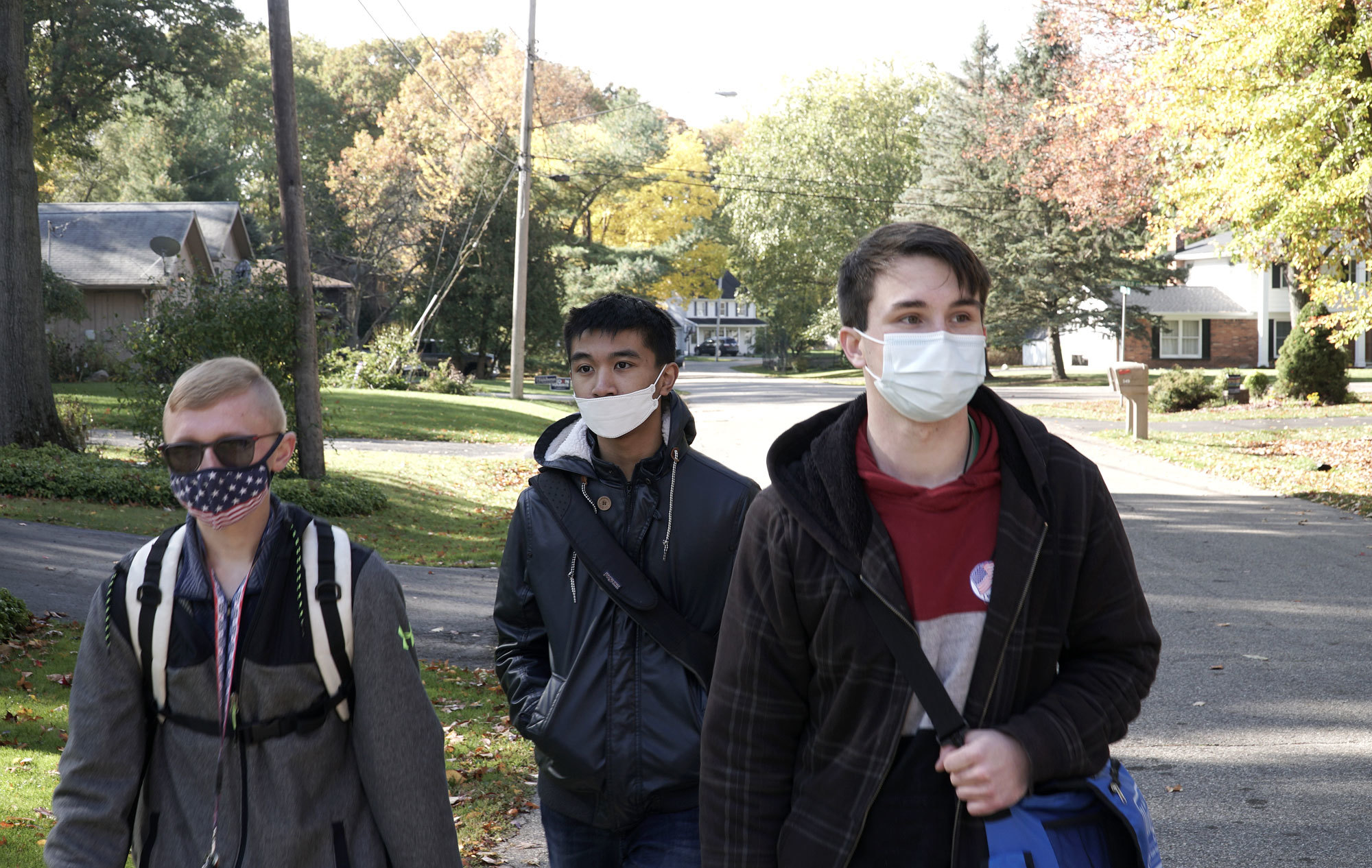
Some were receptive to the message, such as the three men inside the garage of one home, dressed in hunting clothes as they carved up a deer that one of the men had just killed with a bow and arrow.
Halder repeated his rehearsed opening line that Trump had created the best economy in 50 years and that if anyone can get it back on track, it's him. Perhaps reading the room, Halder also stressed that unlike Biden, Trump is staunchly pro-Second Amendment, which guarantees every American the right to bear arms.
"How can we have a president that's not for the Second Amendment," said the one man. "You're president, and you're going to go against it?"
Kathy Heath, a retired school teacher, also needed no convincing from Halder. She, too, will vote for Trump, whom she believes has stood up to other countries with the message that the U.S. won't be pushed around anymore. That said, she admitted she doesn't like Trump's personality. "I just wish he would keep his mouth shut."
Not everyone in this neighbourhood appeared to be keen on the president, including the occupants of a house with a "Pro-America, Anti-Trump" sign posted in the yard. Halder decided to bypass that home — that is, until resident Jim Barron came out to chat.
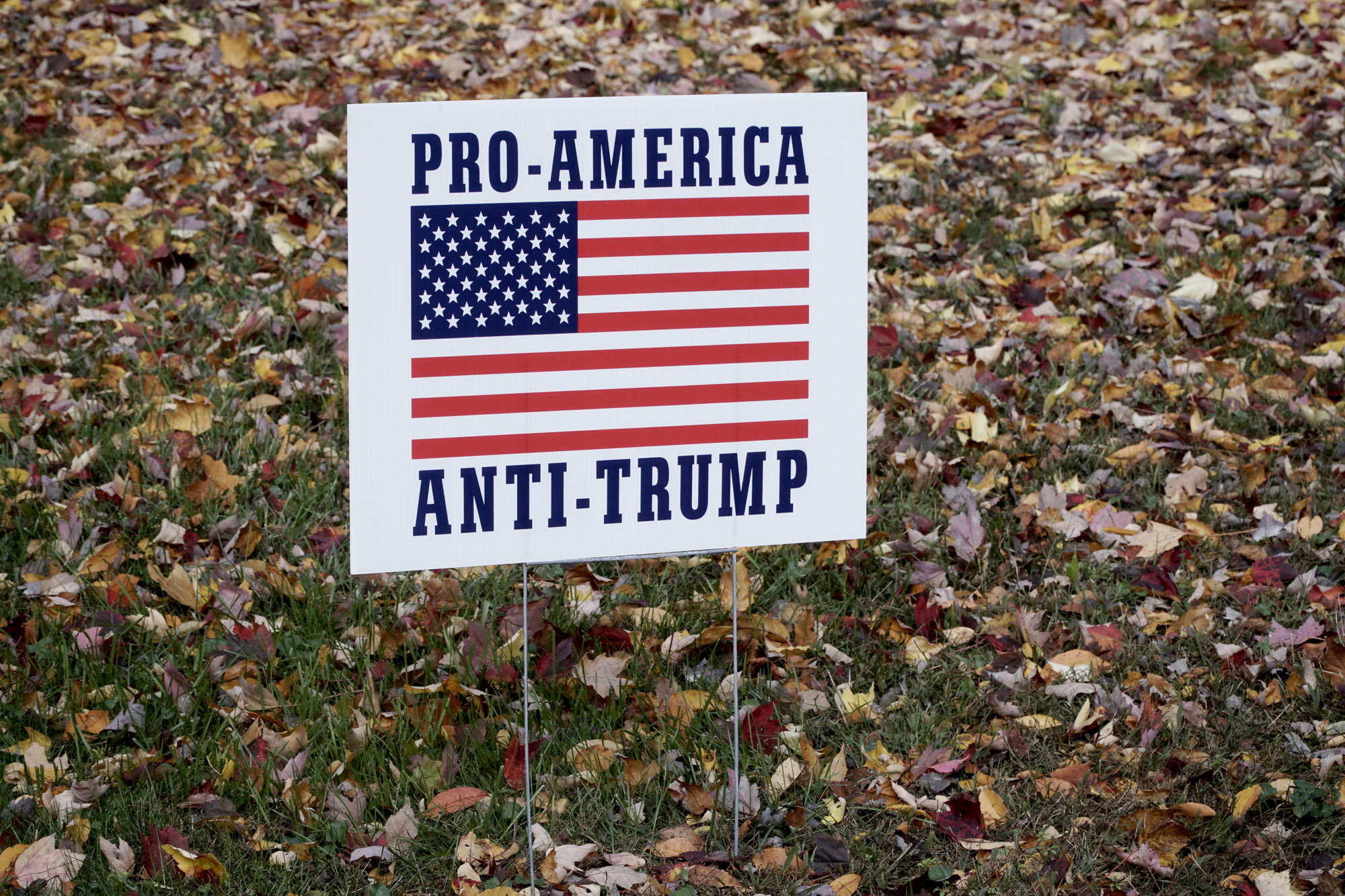
"Yeah, there's zero chance I'm voting for that guy," Barron told Halder. "Yeah, there's no way in hell. My parents are both at home right now with COVID, and I think the president has done a horrible job of handling COVID-19."
Then Barron asked the young volunteer,"So, you guys think he's handled the virus well?"
While Calhoun County has seen a significant spike in COVID-19 cases, Halder defended Trump's actions, saying the president shut down travel from Europe and China, something he claimed Biden was initially against.
Barron countered by saying the president could have imposed a mask mandate and that he was "talking shit about Biden wearing a mask" when he himself may have already been infected with the coronavirus during the first presidential debate on Sept. 29.
"The president is out there saying, 'It's not a big deal, I feel better than I've ever felt before,'" Barron said. "Well, that's cool you can get all these advanced treatments. My dad can't get that. He's just at home, laid out but suffering for weeks, and the president's on TV saying, 'No big deal' about it."
The back and forth between Halder and Barron stayed polite, and in the end, they agreed to disagree.
"I just say Trump has done everything that he can to handle the virus," Halder said.
"Two-hundred-thousand people have died from it," Barron responded. "I think he could have done a better job."
Trump vs. the governor
Barb Arness, who is running for state legislature, had been hoping the biggest Democratic name in the state — Gov. Gretchen Whitmer — would help her canvass neighbourhoods in the city of Rochester.
But events conspired against it. Instead, Arness had to settle for a brief motivational speech from Whitmer to her throng of volunteers who had gathered at a local park.
Addressing the volunteers on another cold, overcast day, Whitmer said, "If after everything I've been through in the last two weeks I can stand here and do this, you can, too."
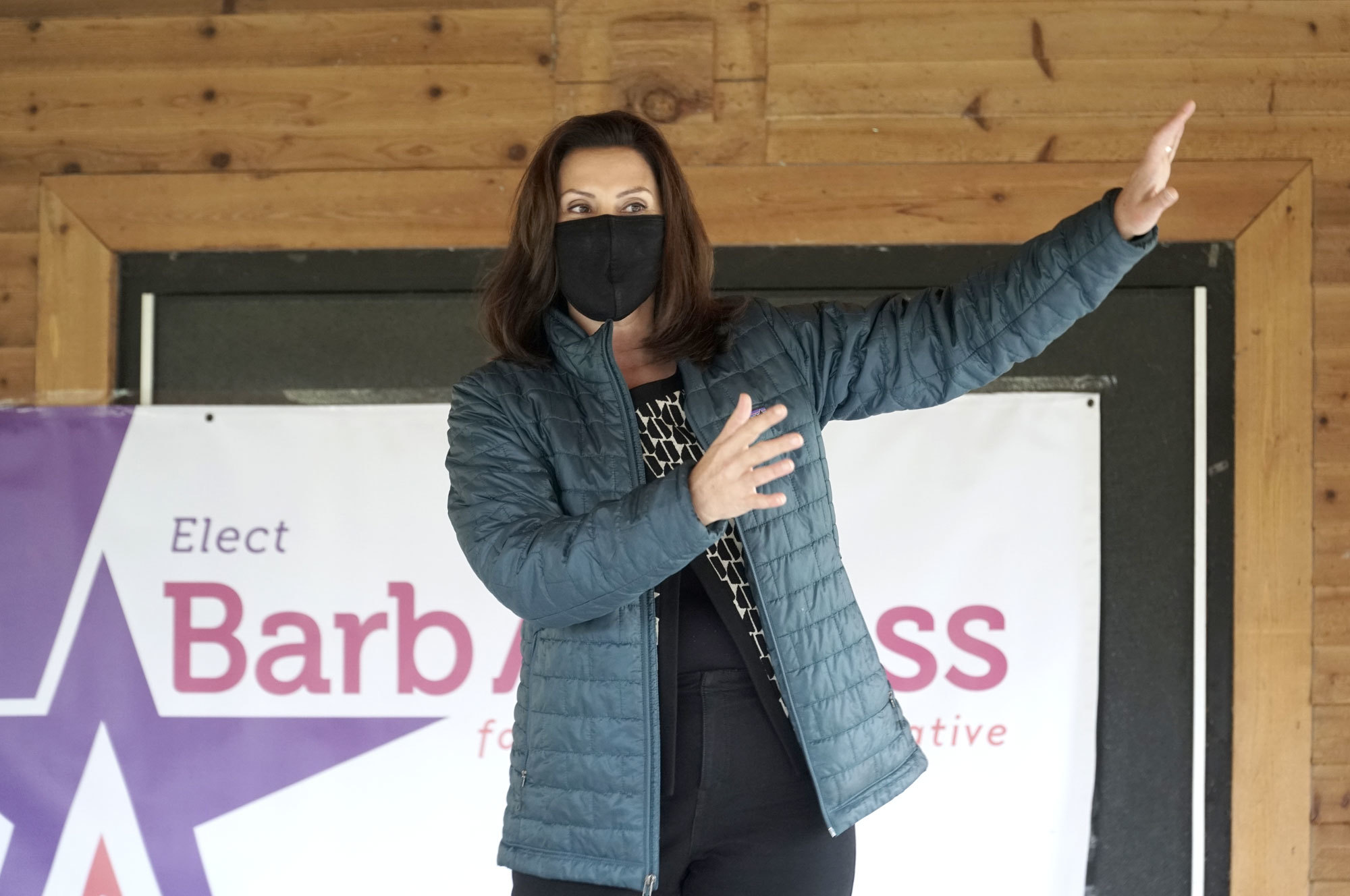
Earlier in the month, the FBI had announced that Whitmer had been the target of a kidnapping plot, allegedly by a group of militia extremists who believed her pandemic lockdown measures were treasonous and a violation of the U.S. Constitution.
That didn't stop Trump supporters at his rally in Muskegon from chanting "Lock her up" when the president made a disparaging reference to the governor.
The coronavirus pandemic has become a significant source of tension between Whitmer and Trump, who has said the governor is "way over her head" in dealing with the crisis and "doesn't have a clue" and that Michigan has become "like a prison."
Back in April, Trump encouraged demonstrations, tweeting, "LIBERATE MICHIGAN." Trump supporters jammed the streets of Lansing to protest Whitmer's lockdown orders. Meanwhile, hundreds of people, some armed, gathered at the state capitol in Lansing earlier this month to oppose her bid to extend emergency powers.
Whitmer has said that Trump's rhetoric is very dangerous for the country, for herself and her family, and for public servants.
"I'm trying to bring the heat down, but I'm also not going to ignore it and pretend that the rhetoric hasn't fed into the plot to kidnap and put me on trial and possibly murder me. Words matter," she said at the Rochester canvassing event.
WATCH | Several people arrested in attempted plot to kidnap Michigan governor:
Trump is clearly hoping there's enough dissatisfaction with Whitmer's COVID-19 response to tilt a close election in his direction, said Yoon. But "so far, that message seems more effective in riling up his base than in winning over undecided or persuadable voters."
As Yoon pointed out, Whitmer is still viewed favorably by a majority of Michigan voters — and far more favourably than Trump. A recent poll found that around 60 per cent of Michigan voters approve of the job Whitmer is doing in handling the pandemic. That same poll had Trump's job approval rating at 44 per cent and suggested 54 per cent of Michigan voters disapprove of his actions on the pandemic.
'This is it ... there are no do-overs'
Compared to the raucous atmosphere of the Trump rally in Muskegon, the mood was more subdued at an event Jill Biden held earlier this month in the parking lot of UAW Local 699 in Saginaw.
Instead of thousands of devoted fans packed into a venue clapping, shouting and cheering her on, about 75 cars sat parked side by side for what was billed as a "drive-in" rally, where the sounds of honking replaced applause.
To avoid the potential spread of COVID-19, attendees were asked to stay in their cars, and either roll down their windows to hear Biden's address on the loudspeakers or listen to it simulcast on one of several local radio stations. Even so, some supporters stood outside their cars.
Jill Biden stood at a podium and gave a short speech to the audience of motor vehicles, hitting all the points on why her husband will bring the country together, why his policies are best for the U.S. and why Trump's days as president are numbered.
Her main message was to get people to go out and vote.
"This is it, Saginaw, there are no do-overs," Biden said, eliciting a round of beeps. "One vote could make a difference between winning and losing a precinct. One precinct could win a state, and one state — yes, state — could decide our future for generations to come."
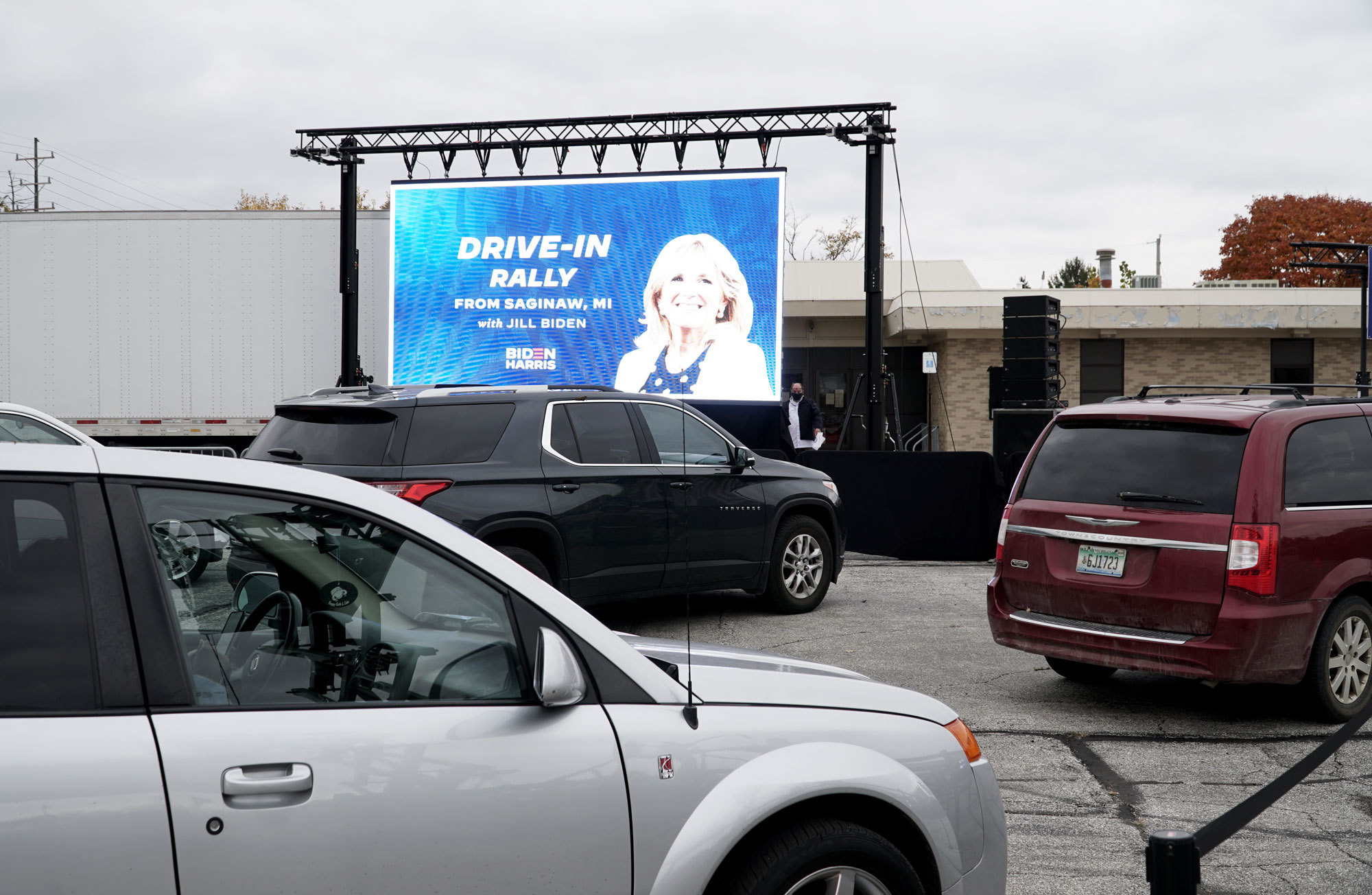
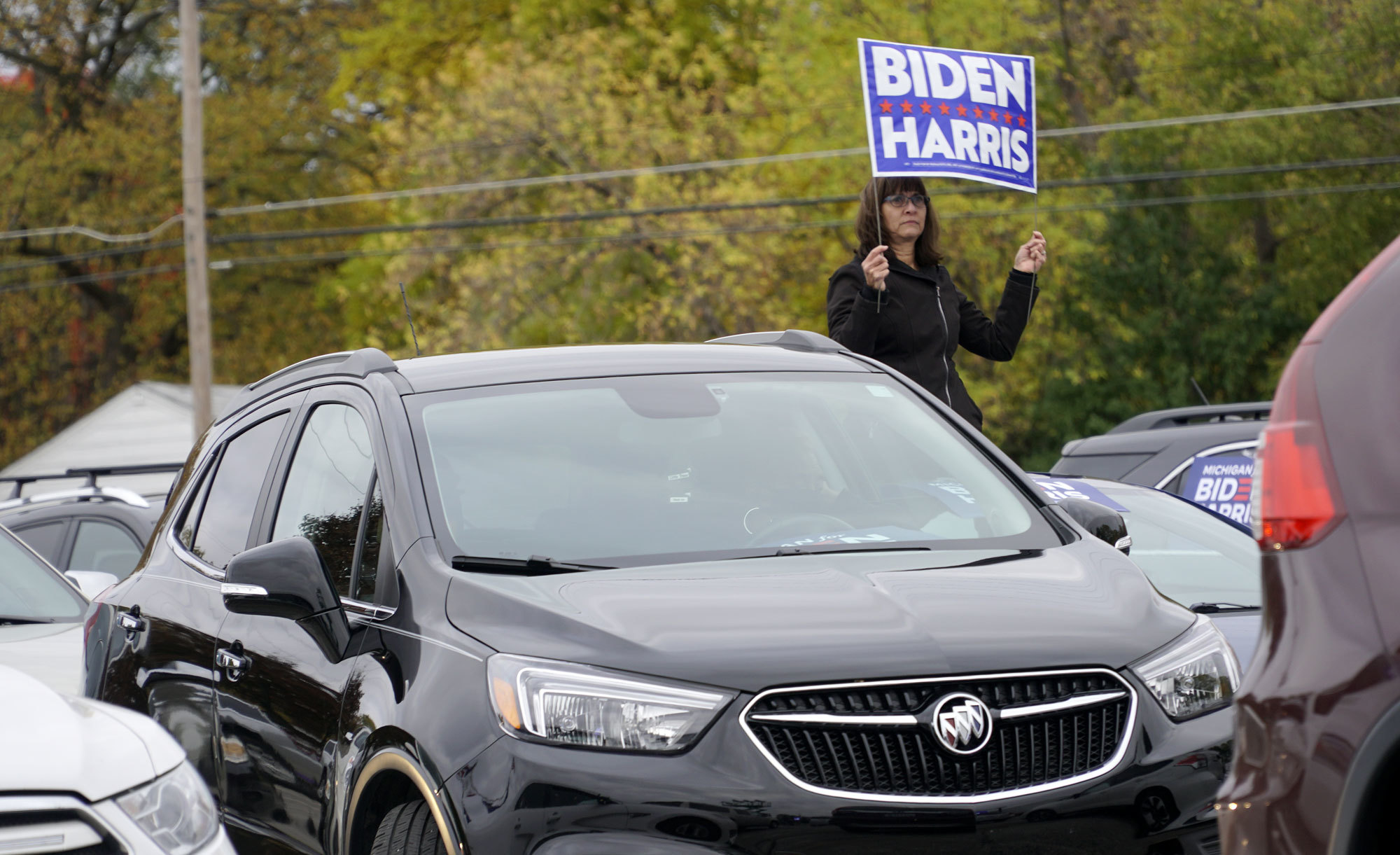
Saginaw was once a hub for manufacturing, but much of that has been hollowed out. It's one county the Democrats are desperate to win back. Obama took it by 11 per cent in 2012, and in 2016, Trump won it by the slimmest margin of any county — a mere 1.1 per cent.
The significance of Saginaw was clear more than a month ago, when Trump held a rally here.
That Jill Biden would host her event there, in the parking lot of a UAW local, isn't surprising, considering the union, which is headquartered in Detroit, endorsed her husband months ago.
Democratic Congressman Dan Kildee was there, in part to remind supporters of the Obama-Biden administration's backing of the auto sector bailout during the financial crisis in 2008/2009.
"We know here in Saginaw, like the people in my hometown in Flint and people in Detroit and all across the Midwest — we know how important it is to have somebody in the White House that has our back," Kildee said. "When the auto industry was in trouble, Joe Biden was there. If others had had their way, the auto industry would have disappeared."
But while UAW officials have backed the former vice-president, that's not necessarily the case for its membership. Over in Macomb County, just outside Chrysler's stamping plant in the city of Warren, workers were decidedly mixed as to who they would support.
John Marshall, a union member who was coming off his shift as a millwright from a plant where he has worked for 27 years, believes Trump has helped the auto industry in Michigan.
"Trump all the way. He's done a lot of things he said he was going to do," said Marshall. "I wish he could just shut up, [but] he does get a lot done. The 401[k]s are doing pretty good."
Marshall admitted he voted for Obama, but, he said, "the Democrats haven't been doing much lately. With Hillary, all that group — they didn't do nothing for years."
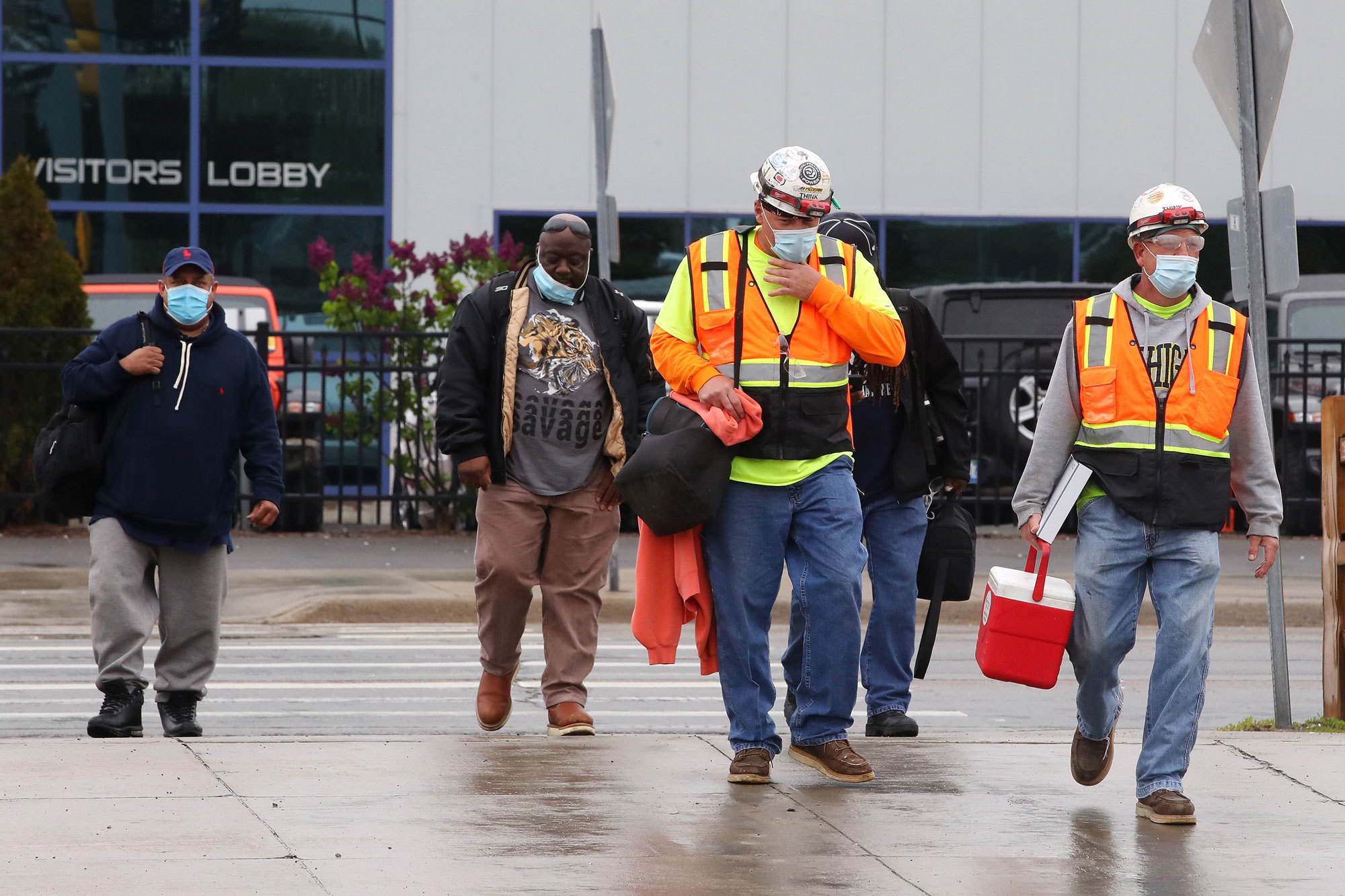
Mike Eckhout, who also works at the plant, said he doesn't enjoy the president's personality, either, but supports his policies. "I don't like the direction that the left is going," he said. "I think [Trump] brought back manufacturing jobs."
On the other hand, Dan Ketching, a pipe fitter at the plant, said, "I can be here all day naming what's wrong with Trump." As for the auto industry or manufacturing jobs in general? "Nothing, he's done nothing."
The reality is a little more complicated. The first decade of this century was really bad for employment in Michigan, as the state lost about 860,000 jobs, said Charley Ballard, an economics professor at Michigan State University in East Lansing. Manufacturing jobs were cut in half, he said.
Jobs started returning to the state in 2010, and over the next seven years, Michigan averaged about 75,000 new jobs a year. But the growth started to slow down again in 2017 (38,000) and 2018 (36,000). By 2019, the state had only 21,000 new jobs.
"So our economy, at least in terms of employment, has been slowing down," Ballard said.
WATCH | Jerome Vaughn of WDET radio station in Detroit outlines some of the most important issues for voters in Michigan:
In manufacturing specifically, between 2010 and 2017, Michigan was averaging a net gain of 20,000 to 25,000 new jobs a year. But in 2018, that dropped to 5,000 and in 2019, 7,000. From January 2019 to January 2020 — before COVID-19 hit — the state had a net loss of 400 manufacturing jobs.
"That is not a story of surging manufacturing employment right now," Ballard said.
Much of that has to do with the combination of flatlined auto sales and increased automation, he said.
So then, what accounts for Trump supporters' belief in him as the president who brought back jobs? Ballard said it's another manifestation of a pervasive phenomenon in American politics right now: "People's view of reality is shaped by their political leanings."
The role of the undecided
There are still those in Michigan who are struggling to decide who should be the next president.
Tiawana Jackson typically votes Democrat, and in 2016, participating in her first presidential election, she threw her support behind Hillary Clinton. But this time around, the 25-year-old resident of Macomb County is undecided.
"I'm not exactly sure what Biden is going to change, or if it's going to change," said Jackson, a mother of two who is studying for her real estate licence.
"I'm undecided about Trump, because I honestly don't want to vote for him. But if Biden isn't going to change anything, either, why change the person that's in office, if they are going to do the same exact thing?"
In the last election, third-party voters helped Trump's victory in Michigan, as did undecided voters. According to exit polls, the late deciders in 2016 ended up voting for Trump.
But in 2020, there's much less of a wildcat vote out there, said Yoon. "There's far fewer undecided voters than there were four years ago and hardly any third-party voters to register much of a difference," he said.
Re-election campaigns tend to be a referendum on the incumbent, and after four years of Trump, Yoon said, voters have really strong feelings one way or the other about him.
"People have had time to form their opinions of him. And historically, late deciders tend to vote against the incumbent," he said.
Biden's polling in Michigan has him at about 50 per cent support. That doesn't necessarily mean he will triumph, Yoon said.
"But it does make it much harder for Trump to eke out a win in this environment."
